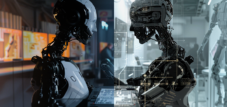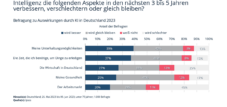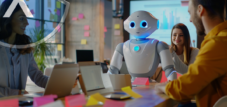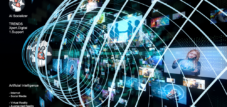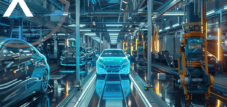10 professions that could be replaced by artificial intelligence (AI) sooner or later - and yet the 'human factor' remains important
Language selection 📢
Published on: August 29, 2024 / update from: August 29, 2024 - Author: Konrad Wolfenstein
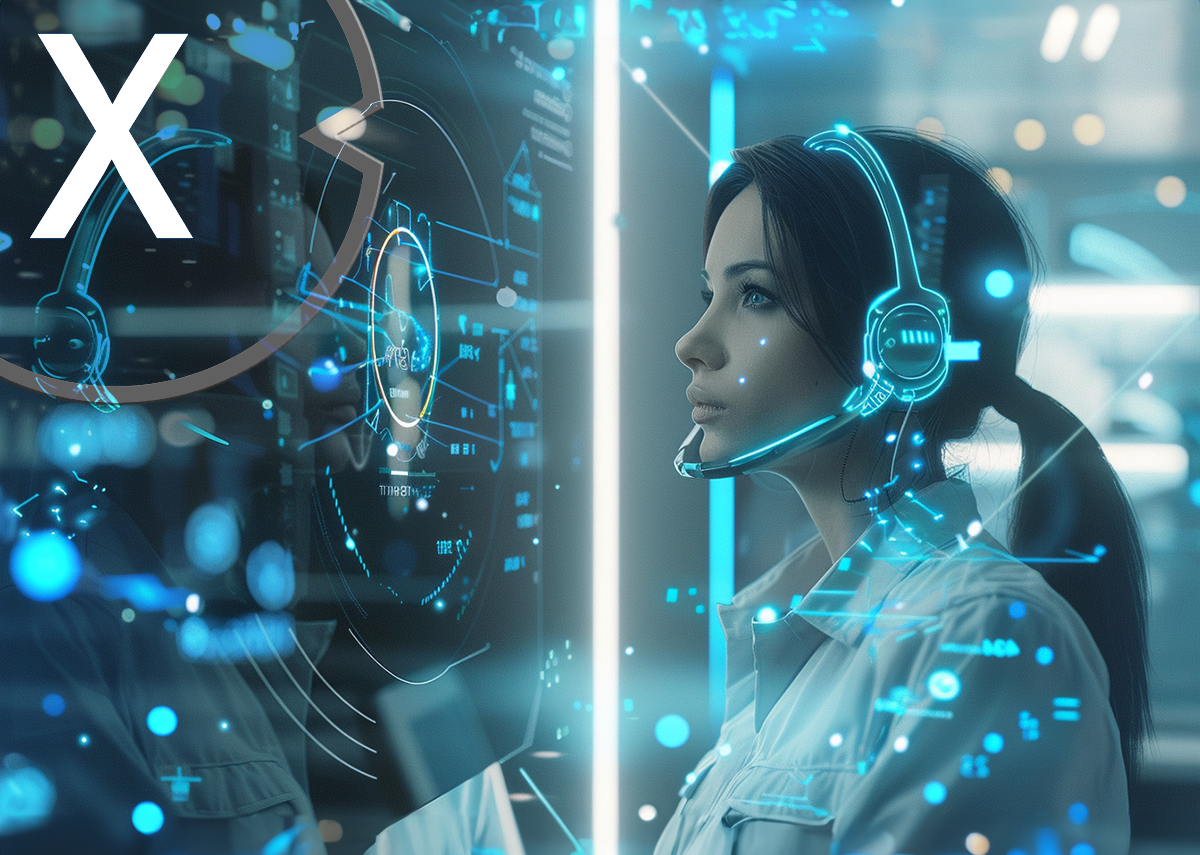
10 professions that could be replaced by artificial intelligence (AI) sooner or later - and yet the 'human factor' remains important - picture: xpert.digital
🔍🌟 Where are humans in the technological world of artificial intelligence?
🛠️ Given the rapid progress in the field of artificial intelligence (AI) and the associated revolutionary business ideas that are characterized by speed, automation, scalability and flexibility, a crucial question arises: Where are people in this technological world? The “human factor” must by no means be pushed into the background, because the more developments become anonymous and depersonalized, the more difficult it becomes to secure long-term success.
🌐 The modern business world is heavily influenced by technology. Automated systems are increasingly taking over routine tasks, algorithms are predicting market trends, and machines are surpassing human capabilities in many ways. These developments offer enormous opportunities to increase efficiency and reduce costs. At the same time, however, they also pose significant risks, especially if people are no longer sufficiently taken into account in these processes.
🏢 A central risk of this technological development lies in increasing anonymity and alienation. When decisions are based solely on data and algorithms without considering the human context, humanity is lost. Companies run the risk of perceiving their employees and customers as mere numbers or indicators. This depersonalization can significantly impact employee motivation and customer engagement.
🌱 In this context, integrity and authenticity become central factors for the sustainable success of a company. It's not just about being at the cutting edge of technology, but also about acting ethically and socially responsible. Companies need to build trust and maintain relationships based on honesty, transparency and mutual respect. This is the only way to create long-term collaborations that ensure sustainable business success.
🤝 The human aspect is invaluable, especially in human resources. Employees want to be taken seriously and valued. A work environment based on mutual respect and recognition not only promotes satisfaction but also productivity. Technology can help by relieving people of monotonous tasks and giving them more space for creative and strategic activities. The key, however, is to view technology as a tool that serves people, not the other way around.
👥 Direct, personal contact is also of central importance on the customer side. Customers want to be able to identify with the brands and companies they interact with. Human empathy and individuality are essential here. AI-supported marketing strategies offer the opportunity to target customers and serve their needs individually. However, it is essential that this process is carried out with the necessary care and taking ethical standards into account.
🌍 Another important aspect is the integration of diversity and inclusion into the technological development process. Diversity in the company promotes creative thinking and innovation by including different perspectives and experiences. Companies that strive for inclusion and build diverse teams are often more successful and resilient to market changes. This applies in particular to the development and application of AI systems. Algorithms that are trained on a broad and diverse database are less susceptible to bias and wrong decisions.
📚 Continuous training and qualification of employees is also crucial in a rapidly changing technology landscape. The ability to adapt to new challenges and continually learn is essential for long-term success. Companies should therefore invest in training programs and the personal development of their employees. This not only strengthens individual potential, but also the competitiveness of the entire company.
🚀 With all the advantages that technological developments bring, people should always be the focus. The use of artificial intelligence and other advanced technologies can significantly increase business success if used with an awareness of the importance of human values and relationships. Integrity, authenticity, trust and respect are the cornerstones that ensure sustainable success in an increasingly digitalized world. It is crucial to find the balance between technological progress and human touch in order to shape a future that is both innovative and ethically responsible.
📈 The modern business world is at a crossroads. Companies that understand how to combine technological progress with human values will be the most successful in the long term. In a world in which machines are taking on more and more tasks, it becomes even more important to put people at the center. Technology should be used to improve people's lives, not replace them. This is the only way to ensure a sustainable and successful future.
💡 Humans will not lose importance in a technological world. Technology and humanity will go hand in hand to overcome the challenges of the future. Companies that find this balance will not only be successful, but also make a positive contribution to society. The path to a sustainable and ethically responsible future lies in combining technological progress and human values.
📣 Similar topics
- 🤖 Man and machine: A symbiosis for the future
- 💡 Technology in the service of humanity
- 🌐 The importance of integrity in the digitalized world
- 🧑🤝🧑 Human values in the focus of progress
- ✨ Automation and the role of humans
- 🏢 A work environment of respect and technology
- 🤝 Building trust in the digital age
- 📈 Sustainable success through human closeness
- 📊 Diversity and inclusion in technological development
- 🏆 Successful through lifelong learning and qualification
#️⃣ Hashtags: #PeopleAndTechnology #SustainableSuccess #Integrity #Diversity #Shaping the Future
🤖👨💼 The best AI expertise is still humans - artificial intelligence in combination with automation, flexibility, scalability and speed
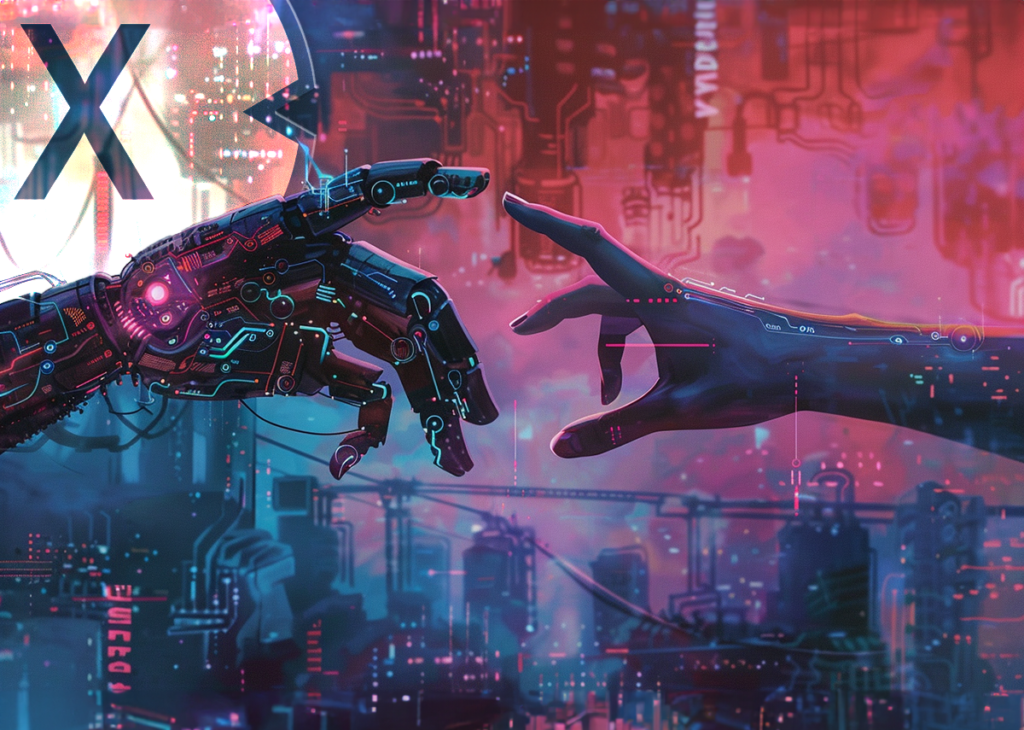
The best AI expertise is still humans - artificial intelligence in combination with automation, flexibility, scalability and speed - Image: Xpert.Digital
At a time when technological development is advancing at a rapid pace, artificial intelligence (AI) is playing an increasingly larger role in our daily lives and in the business world. But despite all the progress and impressive capabilities that AI has now achieved, one central factor remains irreplaceable: people.
More about it here:
🤖 The future of professions: How AI is changing our work 🌐
🌟 With the rapid development of artificial intelligence (AI), many traditional workplaces are facing a fundamental transformation
While some jobs are supported and facilitated by AI, others are at risk of being replaced entirely. This raises questions not only about the future of work, but also about social and economic stability in an increasingly automated world. Below we present ten professions that could be replaced by AI in the near or distant future.
📊 Data analysts and statisticians
Data analysts play a central role in many companies by evaluating large amounts of data and deriving actionable insights from it. However, artificial intelligence can significantly speed up and refine this process. Using machine learning and advanced algorithms, AI systems are able to recognize patterns and connections in data that are difficult for humans to discover. While data analysts will still be needed to interpret and communicate results in the near future, in the long term their role may be reduced by increasingly sophisticated AI systems.
💼 Accountant and tax advisor
Traditionally, accountants and tax preparers are responsible for keeping financial records, calculating taxes, and ensuring all legal requirements are met. However, in recent years, AI has made great strides in automating these tasks. Modern accounting software can already handle many of these tasks automatically by categorizing transactions and generating reports. In the future, AI could go even further and develop complex tax strategies that previously required human expertise.
📞 Customer service representatives
Customer service is another field that has been heavily impacted by the introduction of AI. Many companies already rely on chatbots and automated phone systems to handle simple customer inquiries. These systems are constantly being developed and are increasingly able to answer more complex queries. AI's ability to understand and respond to natural language will continue to increase over the next few years, which could result in human customer service agents becoming redundant in many areas.
🏭 Factory workers
The automation of production processes is a trend that has been observed for decades. Robots and AI-controlled machines have taken over the role of human workers in many factories, especially in monotonous or dangerous tasks. As AI advances, these machines can take on increasingly complex tasks that previously required human skill and judgment. This could lead to a further decline in manufacturing jobs, particularly in industries where precision and speed are critical.
🗞️ Journalists and editors
Journalism is also not immune to the effects of AI. AI systems can already write simple news articles, especially in areas such as sports reporting or financial news, where the focus is primarily on compiling data. This technology will evolve in the future so that AI will also be able to write more complex texts that require human creativity and language understanding. While journalists continue to play an important role in in-depth reporting and analysis, routine tasks could increasingly be taken over by AI.
🚗 Delivery and taxi vehicle drivers
The introduction of autonomous vehicles could represent one of the biggest transformations in transportation since the invention of the automobile. Self-driving cars and trucks are no longer a dream of the future, but are already being used in pilot projects around the world. Once this technology matures and becomes widely accepted, it could mean the end of many transportation jobs. Delivery drivers, taxi drivers and truck drivers could be replaced by AI-controlled vehicles that work around the clock and minimize human errors.
🌐 Translators and interpreters
Translation of texts and spoken language is another field in which AI has made significant progress. Tools like Google Translate and other AI-based translation systems are constantly improving and already offer amazingly accurate translations in real-time. Although human translators will still be needed for more complex and nuanced texts, AI could take over these tasks in many everyday situations, such as tourism or business travel.
🩺 Doctors for diagnostic tasks
Medicine is an area in which AI is already making significant contributions. AI can provide enormous support in the analysis of medical images, laboratory values and patient data, especially when diagnosing diseases. Systems like IBM Watson have demonstrated that AI is capable of making accurate diagnoses and suggesting treatment plans based on the latest scientific knowledge. While human empathy and personal care from doctors remain irreplaceable, certain diagnostic tasks could increasingly be taken over by AI.
⚖️ Lawyers for basic legal services
AI could also play a growing role in legal advice, particularly in routine tasks such as drafting contracts, reviewing documents or conducting legal research. By analyzing large amounts of legal documents, AI can detect patterns and precedents that are difficult for human perception. In simple cases or for standardized legal services, AI-based systems could represent a cost-effective alternative to human lawyers in the future.
🛒 Cashiers and sales staff
Automation is also on the rise in retail. Self-checkout and online shopping are already having a significant impact on the need for cashiers and sales staff. AI-based systems can analyze customer preferences and make personalized recommendations, further automating the shopping experience. In the future, smart stores, where the entire shopping process from product selection to payment is automated, could make the traditional role of sales staff obsolete.
🌐 Advances in Artificial Intelligence
Advances in artificial intelligence offer immense opportunities, but they also pose significant challenges for the job market. Many jobs that are still considered safe today could disappear or change radically in the coming decades. It is therefore crucial that education systems and companies prepare for these changes and develop strategies to ensure employability in an automated future. At the same time, ethical considerations and social protections should not be ignored in order to enable a fair transition into this new world of work.
📣 Similar topics
- 🤖 Artificial intelligence and the future of work
- 💼 Careers changing through AI
- 📉 Impact of automation on jobs
- 🚀 AI advances in various industries
- 🤔 Challenges of the working world through AI
- 📊 Data analysts and machine learning
- 🧮 Automation in accounting and taxation
- 📞 AI in customer service: chatbots and systems
- 🏭 Production and automation in factories
- 📰 Journalism and the role of AI
#️⃣ Hashtags: #ArtificialIntelligence #Automation #LaborMarket #FutureOfWork #TechnologyInProfession
We are there for you - advice - planning - implementation - project management
☑️ SME support in strategy, consulting, planning and implementation
☑️ Creation or realignment of the digital strategy and digitalization
☑️ Expansion and optimization of international sales processes
☑️ Global & Digital B2B trading platforms
☑️ Pioneer Business Development
I would be happy to serve as your personal advisor.
You can contact me by filling out the contact form below or simply call me on +49 89 89 674 804 (Munich) .
I'm looking forward to our joint project.
Xpert.Digital - Konrad Wolfenstein
Xpert.Digital is a hub for industry with a focus on digitalization, mechanical engineering, logistics/intralogistics and photovoltaics.
With our 360° business development solution, we support well-known companies from new business to after sales.
Market intelligence, smarketing, marketing automation, content development, PR, mail campaigns, personalized social media and lead nurturing are part of our digital tools.
You can find out more at: www.xpert.digital - www.xpert.solar - www.xpert.plus






